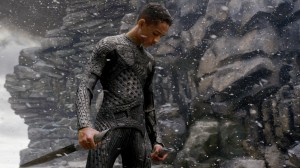To celebrate the 15th anniversary of M. Night Shyamalan’s Oscar nomination for Best Director, and to demonstrate just how far the filmmaker has fallen from grace, I present the following review of 2013’s “After Earth.”
It’s easy to dismiss “After Earth” as the latest flop in the downward spiral that is director M. Night Shyamalan’s once-promising career. In what is ostensibly a coming-of-age story, Will and Jaden Smith respectively play legendary general Cypher Raige and his less talented son Kitai, who dreams of becoming a ranger like his dad. Their estranged relationship is tested after the two are shipwrecked on Earth, a millennium after catastrophic events have forced humanity to find a new home.
Indeed, at face value, “After Earth” is largely derivative, generously borrowing generic conventions from other (read: better) sci-fi flicks. Yet such an examination fails to acknowledge that “After Earth” more importantly marks a dramatic departure from Shyamalan’s film oeuvre. Unlike the synchronic modernity characteristic of its predecessors, “After Earth” establishes a distinctly self-referential, meta style that demands it be appreciated as diachronically postmodern.
Shyamlan’s casting choice of real-life father and son, for instance, blurs the line between story and storyteller; actor Will Smith, who served as a producer for “After Earth,” also produced his co-star, literally. This disintegration of narrative and authorship functions beyond the film’s diegesis, however, addressing also the underlying ontology of digital cinema as an artistic vehicle. As literary critic Fredric Jameson outlined, the self-referential aesthetic reflects a singular modernity wherein the viewer becomes acutely aware of the film’s intrinsic artifice. In this case, Cypher and Kitai’s heavy reliance on digital video technologies to communicate with each other, albeit futuristic, signifies a sort of digital realism. Using these devices as a visual trope, Shyamalan thus establishes an indexical relationship between film and filmmaker.
Cypher [to Kitai]: Recognize your power. This will be your creation.
According to Jameson, the chaotic bricolage of the film —that is, the deconstruction of dialogue, as seen in the line above wherein Cypher explains to Kitai the consequences of “throwing a rock at a wild monkey” — is thus recreated with little regard to context, continuity, and other conventions of good cinema.
In this way, the film is not simply a cautionary tale about globality, urban sprawl, and their environmental implications. “After Earth” as postmodernism transcends allegory and provides a biting metacommentary or nonallegory about Shyamalan himself. Consider the scene where Kitai questions his father’s orders to abort the mission. “What was your mistake?” Kitait asks into his jumpsuit’s built-in camera. “Trusting me? Depending on me, thinking I could do this?” Intended to mimic Cypher’s perspective via the ship’s video feed, the shot appears to momentarily break the fourth wall, with Kitai seemingly addressing both his father and the viewer. This simultaneity juxtaposes Kitai’s desire to gain his father’s approval with Shyamalan’s own attempt to salvage his tarnished reputation as a director.
The scene’s remarkable self-referentiality later resurfaces when Kitai wakes up from a self-induced coma.
Kitai: Hey …
Cypher: Hey …
Kitai: That sucked.
Cypher: That is correct.
Rooted in the tradition of postmodernism, not only are the characters’ story functions mutable, but their non-diegetic purports seem plasmatic as well. Shyamalan is represented here by neither Kitai nor Cypher, whose shared sentiment that “that sucked” instead reflects the film’s poor reception amongst critics. Similarly, the aforementioned coma foreshadows the viewing experience of “After Earth” — a tedious, drawn-out ordeal that can also cause a loss of consciousness.
Moments like these testify to Shyamalan’s undeniable, if unintentional, mastery of meta. Though unlikely, it’s possible that Shyamalan is himself unaware of “After Earth” as postmodernism. Early in the film, Cypher tells his wife that after the mission to Iphitos is completed, “I’m announcing my retirement.” A postmodern reading of this line is both telling and prophetic: perhaps Shyamalan should do likewise.
Gould is a member of the class of 2014.






